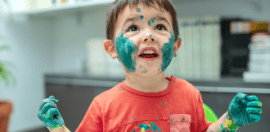It’s good that children’s mental health is finally being addressed – but there is more to do

30 June 2022 at 8:47 am
Despite immense progress in the space, infant mental health remains comparatively unaddressed and often poorly understood, writes Deb Tsorbaris.
An unprecedented shift in the discourse surrounding mental health in recent years has repositioned it as a priority area of healthcare for the first time in many Western countries.
Mental health has long been sidelined by governments and policymakers, and it is reassuring to see this incredibly important aspect of human wellbeing being recognised and addressed on a greater scale than ever before.
Yet despite immense progress in the space, one area of mental health remains comparatively unaddressed and often poorly understood: infant mental health. Infant mental health describes the capacity of a child during the first three years of life to form close relationships, recognise and express emotions, and explore and learn about their environment. The fact that these definitions are quite distinct to the way we define and think about mental health in adults, and that infants are unable to express themselves verbally, may explain in large part why infant mental health is so commonly overlooked and underrepresented in the field.
Infant mental health is of paramount importance to a child’s wellbeing, development and future outcomes. During infancy, a child is constantly learning from their surrounding environments, equipping themselves with the skills needed for later life, and laying the foundations for subsequent development. But development is easily upset during these formative years, when unstable or traumatic environments can trigger a domino effect of lifelong mental ill health issues.
It is well-documented that experience of family violence, household substance abuse, mental illness, parental incarceration or separation, or insecure relationships with parents or caregivers from a young age is strongly associated with increased risk of mental illness in later life. Yet few appreciate the extent to which this cause and effect interplay exists all around us. In Australia, an estimated 8 per cent of infants are deemed to be at risk of mental illness as a result of exposure to environmental factors. This illustrates the urgent need for action to shield children from such stressors, and to create environments in which all children feel loved, respected and secure.
There are effective ways of managing infant mental health that we know work. Supporting parents and caregivers to strengthen stable and responsive relationships with the child in their care reduces stress and the impact of trauma, and is the most significant factor influencing the development of resilience in children. We also need to recognise the impact that a parent or caregiver’s mental health has on their child. Mothers’ stress reactions and mental health have a critical impact on infant development, and should be managed accordingly, for the benefit of both mother and infant.
At a macro level, we need to acknowledge and address the link between poverty, homelessness and poor mental health to a greater degree. By alleviating poverty, systems such as Centrelink and the NDIS are not just supporting families to support themselves, but are lessening the impact of poverty on infant mental health and wellbeing.
Of course, protecting children from neglect and abuse indisputably plays a pivotal role in improving mental and wellbeing in children. The recent ABC national study on child protection failures revealed that the child protection system is buckling under the pressure of high demand. In the absence of adequate investment in early intervention, evidence informed models, and appropriate mental health and wellbeing responses, children are not faring well. The findings of the study provided anecdotal evidence that corroborates what we already knew: that children with an experience of out-of-home care require nuanced and holistic care that is considerate of the extreme adversity that they face.
There has recently been some positive movement towards better mental health services for infants and parents. In 2019, the Royal Commission into Victoria’s Mental Health System called for a new infant, child and family mental health and wellbeing system for children aged 0-11 years, and a new system that guarantees that infants, children, and their families receive the treatment, care and support they need. More recently, the Victorian government committed to establishing three new infant, child and family hubs that will integrate children’s mental health, health and development in a one-stop, holistic approach to care.
Outside of Victoria, other states are also venturing into the infant mental health space. A review for the Mental Health Commission of New South Wales concluded that positive infant mental health outcomes require a whole-of-government, cross-sectoral approach, and found that early intervention and supporting parents to create safe homes were important factors in a child’s healthy development. At a federal level, the National Children’s Mental Health and Wellbeing Strategy recognised the importance of empowering parents, carers and communities to support children from infancy.
All this is reason for optimism, and I am comforted to know that the way we address infant mental health as a society is evolving. The massive uptick in mental health problems that arose during the pandemic compelled governments to mainstream and prioritise mental health in public policy, and this is encouraging. Just recently, Infant Mental Health Awareness Week took place, driving recognition of this critical area. While there is more to be done, we are surely on the right track. I hope that this momentum continues.








This is exactly what I have been working on empowering children to build emotional strength and be able to reach out and address emotional challenges while they are children rather than as traumatised teenagers.
The challenge is to be able to engage with children with so much competing technology and external influences that impact on children.
These influences, many negative, are shaping our children’s demeaner and personality many times in the wrong way.
Engaging with children from Grade 1 through a story, reward, empowerment and a famous person as an online AI mentor speaking into the life of the child everyday, will achieve that breakthrough over all the other negative noise.